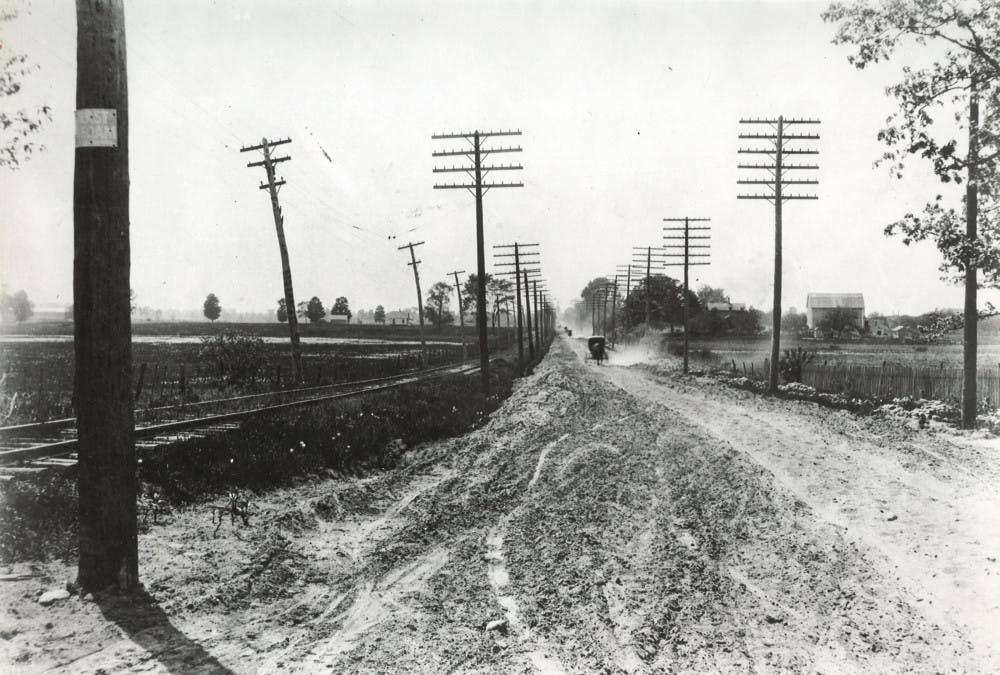For all intents and purposes, the original home of MSU is not East Lansing — at least in name.
In 1855 the legislature of Michigan created the Agricultural College of the State of Michigan, or ACSM, nearly four miles outside the state’s Capitol of Lansing. The unnamed spot of land became the eventual site of MSU as it is known today.
As the college developed into the sprawling 13.67 square miles that make up campus, so did the city.
According to the program given out at East Lansing’s Golden Anniversary celebration, the site of the first 30 years of development of MSU was known as the Village of Agricultural College. Thus, this unincorporated town, or area without independent governance, was the home of MSU.
When the need for housing and buildings to service the students and faculty reached its tipping point, the community decided land needed to be put aside to develop the city.
Without a real estate developing company, the community chose two important faculty members – W.J. Beal and R.C. Carpenter.
The two plotted land, which became “sixty-nine lots located across Michigan Avenue from the west entrance to the college,” according to a website dedicated to East Lansing history created by MSU alumnus Kevin Forsyth.
Forsyth could not be reached for comment.
Beal and Carpenter named the newly-plotted lots Collegeville. A Michigan Historical Marker is placed out front East Lansing City Hall commemorating the efforts of the two men and the incorporation of East Lansing.
The sign can be misleading, as at first glance it suggests East Lansing was at once named Collegeville but that was only the name of the area’s first subdivision.
From Collegeville, other subdivisions began to sprout, building off Beal’s and Carpenter’s work at mapping out the area, more places were platted, including what it now East Lansing’s business district. Sometime during the creation of multiple subdivisions, the area took on another name. This time the community called itself Agricultural College, Mich.
The rapid growth, however, couldn’t keep up with the demand and necessities of the community beginning to take shape in the area.
The citizens of the community felt it was time for the community to become a city. They sought to incorporate the area into either a village or city.
However, “there was no unanimity on which it should be or on the name that should be given the municipality,” according to the Anniversary program.
Three men, C.B. Collingwood, postmaster in the community, A.M. Brown, secretary of ACSM and community attorney C.C. Wood, were tasked with drafting a charter and a bill for the city’s incorporation bid before the legislature. The program from the 50th Anniversary sates, “several names were proposed and the (state) Legislature selected the name of East Lansing” in 1907.
The program makes no mention of the names proposed. However, local historians have uncovered potential names for the city that were lost in history.
Suggested names included, Collegeville, Bird Center, College Park and for it to remain Agricultural College.
“I have always heard that Collegeville was the common name in MAC’s early days,” Valerie Marvin, president of the Historical Society of Greater Lansing, said. “However, if you look in the House Journal for 1907 you will see it referred to ask College Park, which is then replaced by East Lansing.”
The original lines of the House Journal suggest the name College Park was brought forward in the bill created by Collingwood, Brown and Wood.
“After much debate the legislature finally decided upon ‘East Lansing,’ despite that this name might lead to the obvious misconception that the new city was actually a part of Lansing,” Forsyth said on his website. “It has been rumored that the Post Office might have had something to do with this choice, as the name lends itself to logical mail delivery.”
After the debate, the bill was changed for the town to be called, “East Lansing.”







